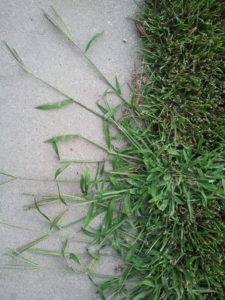Fertilization and Weed Control: Crabgrass
Crabgrass, the most known weed:
Crabgrass is an annual weed that is very well known in the Indianapolis and surrounding area. However, a good fertilization and weed control program can prevent crabgrass from taking over your lawn. At Green’s Lawncare, we have year of experience dealing with crabgrass and have a great program for prevention. Crabgrass is one of the most researched grassy weeds in academia. Purdue’s Turf Science program has a lot of more in-depth information on the weed. However, we are going to give you a crash course on what the weed is and how to prevent it from coming into your lawn.
Where Crabgrass is found:
Without proper fertilization and weed control, Crabgrass can be found all throughout the midwest. Especially in Central Indiana we see it a lot. It is found more often in grassy areas than anywhere else. But, it can be found in landscape beds, side of roads, industrial areas, and cracks in pavement or concrete. It spreads very fast and roots at the nodes on the plants stems. This means it can spread from the lawn and make it’s way into a landscape bed. That being said, it is a weed that is easily controllable with the correct professional lawn care program.Growing Season for Crabgrass:
The annual weed itself has a long growing season if it is not addressed. Crabgrass only lives 1 year at a time. It will die at the first frost. However, during the active growing season it grows tillers. Those tillers have thousands of seeds that are deposited into the lawn/soil. Those are the seeds that germinate the following season. Once soil temperatures reach 55 degree’s the seed will germinate. So this weed germinates early in the spring, unless you have a solid fertilization and weed control program in place that includes pre-emergent.Weed Control for Crabgrass:
Weed control comes in 4 forms for this tough annual weed. You see, Crabgrass is extremely persistent… If your lawn is already infested with crabgrass, you have 2 choices. You can either pull the crabgrass by hand or you can use a chemical approach. If you choose the chemical approach, you will probably need a non-selective herbicide with glysophate. A product including glysophate will kill everything it touches. So make sure it only gets on the crab grass itself. Once it is dead you can reseed.Reseeding.. Brings us to the 3rd option. Aeration and Overseeding will help to prevent crabgrass. The thicker your lawn, the less chance weeds will have any room to grow. Weeds typically only present themselves, when they have room to grow. The goal with aeration and overseeding is to choke out the weeds and not give them the ability to grow. Aeration and overseeding must be done a minimum of 6 weeks prior to the first frost of the year as the seed must reach maturity prior to the first frost. Once the winter passes, the 4th and final approach to control crabgrass is to apply 2 rounds of pre-emergent. A quality fertilization and weed control program will include crab grass pre-emergent. This must be applied before the soil temperature reaches 55 degrees. The goal is to chemically not allow the crabgrass seeds from germinating.